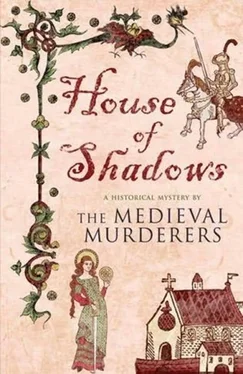‘God does not approve of grudges,’ announced Preacher Parr. ‘Not unless they are just.’
‘Who decides what is just?’ asked Chaloner provocatively.
‘God’s faithful servants,’ replied the clergyman loftily. ‘Men like me . It was my misfortune to run foul of Browne when I tried to preach the good word to his crew – he had me thrown into the river. He was a violent brute, and God gave him a violent end.’
Chaloner recalled that Hannah and York had mentioned some past disagreement between Browne and the preacher, which had led them to put Parr on their list of suspects. The incident did not sound very serious, and Chaloner imagined Browne would barely have given it a second thought, but he could imagine how it might have gnawed at Parr’s fanatical heart. He would see it as an insult to his crusade for God and might well have decided to avenge himself with a convenient rock.
‘It was a pity one of his sailors decided to brain him,’ said Hay, his expression unreadable. ‘Personally, I thought him a decent fellow, though we only exchanged a few words before he died.’
‘Were you present when he was murdered, then?’ asked Chaloner innocently. ‘I thought he was killed in Jamaica House.’
‘No, he was attacked here ,’ said Margaret, almost invisible in a cloud of smoke. ‘But Hay arranged for the law courts to be told it was Jamaica House, which was nice of him. I do not want my lovely home associated with sordid doings like murder, after all.’
There was a short, awkward pause, during which everyone thought, but did not say, that most people would consider treason and sedition just as sordid as an unlawful killing. Meanwhile, Hay grimaced, annoyed that she should expose his meddling with justice quite so readily.
Chaloner smiled pleasantly at the shipping magnate. ‘What did you and Browne exchange a “few words” about?’ he asked.
Hay was wary. ‘I cannot recall now. The incident was weeks ago, in April. Why do you ask?’
Chaloner shrugged. ‘Because I dislike the notion of seamen lobbing rocks at us senior officers. What led Walduck to strike Browne dead?’
Hay was thoughtful. ‘Well, Walduck did not draw his sword to protect Browne the moment he heard footsteps approaching, and Browne reprimanded him for it. That annoyed him – I could tell.’
‘Enough to want to kill him?’ asked Chaloner. It did not sound a very powerful motive.
‘Criminals do not behave in the same way as normal men,’ said Hay sagely. ‘After the spat, I led Browne to the cellar where we hold our meetings, but he must have lagged behind, because when I reached the bottom of the steps I looked back to find him gone. I assumed he was with Strutt.’
‘He was not,’ said Strutt, a little too quickly. ‘I disliked him and did not want to be in his company. I kept my distance. His men were with him – I was not.’
It was a very vehement denial, and Chaloner regarded the purser curiously. Just how angry had he been about Browne’s accusations regarding his honesty? Strutt was bitter and spiteful, just the kind of man to throw a stone at an enemy rather than confront him with a sword.
‘I was some way away when the commotion started,’ added the preacher helpfully. ‘But I saw Walduck throw the rock.’
‘How?’ asked Chaloner sceptically. ‘If you were some distance off, then how could you have seen what happened? Further, I understand this meeting was late at night, so it would have been dark.’
The rector grimaced. ‘Well, perhaps I did not actually see the missile in flight, but it was obvious what Walduck had done. He made no attempt to deny the charge when I accused him of it.’
‘He just stood there,’ agreed Strutt, ‘and refused to answer questions. All he said – kept repeating – was that masonry from the house had dropped on Browne.’
‘Wicked lies,’ said Castell, reaching for more wine. Margaret nodded fervent agreement. ‘Our masonry has never hit anyone before.’
Hay continued his tale. ‘When I went to see what had happened, Browne was lying on the ground. His two sailors were leaning over him, and – as Parr just said – it was obvious that one had taken the opportunity to commit murder.’
‘Did they run away when you came?’ asked Chaloner.
‘No. They said they had been walking along behind him when he had just collapsed. Walduck was astonished when we later arrested him. He told us we would never be able to prove it.’
‘You should have seen his face at the trial,’ crowed Strutt. ‘He could not believe the jury’s verdict and kept insisting that masonry was to blame. A lump did fall, as it happened, but it was too far away to have hit Browne.’
‘Walduck was a drunken fool!’ declared Hay irritably. ‘And the attention that accrued from Browne’s death was something we all could have done without.’
‘So Hay had words with his friends in the law courts,’ finished Margaret. ‘To protect us all from scandal. He had the matter expedited too – Walduck tried and executed at top speed, so he could be buried and forgotten.’
Hay regarded her sharply, as if he detected recrimination in the comment. Margaret merely blew a smoke ring and beamed benignly at him.
‘How did you know Walduck was the culprit?’ Chaloner asked curiously, looking at each person in turn. ‘It could have been the other sailor – Tivill.’
‘Because Tivill had a sword in one hand, a dagger in the other, and he was struggling with Browne’s frisky horse,’ replied the preacher promptly. ‘He had no spare hands to lob rocks with. Besides, why use a stone, when weapons of steel were available?’
‘The same could be said about Walduck,’ Chaloner pointed out.
Parr sighed. ‘Yes, but Walduck was a killer – you could see it in his eyes.’
Chaloner was acutely aware that all their accounts were based on supposition and prejudice, and he was not sure he believed any of them. His questions were clarifying nothing about the night of the murder, or about the roles played by his various suspects.
‘I heard a thump,’ said Strutt. He smiled, as if the memory afforded him pleasure. ‘It was almost certainly Walduck’s stone cracking Browne’s skull.’
‘Had any of your associates arrived at Bermondsey House when all this happened?’ Chaloner asked, looking around at them. ‘Or were you and the two sailors the only ones there?’
The preacher shrugged his thin shoulders. ‘Others were gathering for the meeting, but it was dark, as you have pointed out, and impossible to see much. Some came to see what had happened, but they usually wear hoods, so I could not tell who indulged his curiosity and who left before there was a fuss.’
‘Did anyone ask Tivill what he saw?’ asked Chaloner. ‘He must have been the closest-’
‘He saw nothing, because he was trying to control the horse,’ replied Strutt, rather quickly. ‘It was prancing about, and as he was holding a weapon in either hand he was trying to control the beast by gripping the reins in his teeth. The fellow is an imbecile!’
Chaloner recalled Tivill from Rosebush and concurred that he was not the kind of man who would know how to cope with a situation that required three hands. He had been a liability on the ship, and only escaped hanging himself among the lines and cables because his shipmates watched out for him. His only virtue, as far as Chaloner could tell, was his willingness to fight. He was perfectly happy to lead charges against an enemy, even when they appeared to be suicidal, and Browne had used him accordingly.
‘I find this discussion distasteful,’ said Preacher Parr with a fastidious shudder. ‘Let us talk about our business instead. How many guns on your ship, Garsfield?’
Читать дальше












